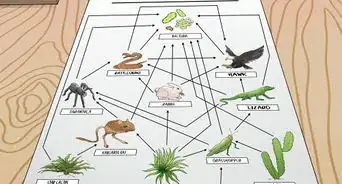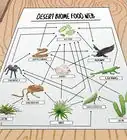This article was co-authored by wikiHow Staff. Our trained team of editors and researchers validate articles for accuracy and comprehensiveness. wikiHow's Content Management Team carefully monitors the work from our editorial staff to ensure that each article is backed by trusted research and meets our high quality standards.
There are 9 references cited in this article, which can be found at the bottom of the page.
This article has been viewed 9,371 times.
Learn more...
Studying animals for a living is not only rewarding, it can also help provide valuable information for those fighting to protect animal species. If you’re interested in studying animals, you can start preparing for your career in high school. Then, once you’ve earned the relevant college degrees, you can find a job and spend the rest of your days surrounded by either cute and cuddly or large and ferocious animals depending on your preferences.
Steps
Bulking up Your College Application
-
1Take courses in science and math in high school. Studying animals requires extensive knowledge in biology, physics, and chemistry to understand not only the animals but the environments in which they live. You’ll also need to understand advanced mathematics to study data related to population and migration patterns.[1]
- Zoologists have also started using computer programs like geographic information systems to track animals. It might be a good to take a few computer science courses as well.[2]
-
2Contact zoologists and scientists in related fields. Find a university near you with a zoology, biology, or ecology department, and contact professors in the department via email. Ask them what they were required to do to study animals for a living and what you should do to do likewise given your specific circumstances.[3]
- You can also consider contacting a local veterinarian to find out what it’s like to work with animals on a daily basis.[4]
Advertisement -
3Volunteer at a zoo, aquarium, or animal sanctuary. Find a zoo, aquarium, or animal sanctuary near you and contact them via email, telephone, or their website to find out how you can become a volunteer there. Not only will this give you valuable insight into what it’s like to work with animals, it will also look great on your college applications![5]
- For example, to volunteer at the National Zoo in Washington, D.C., you’d visit https://nationalzoo.si.edu/support/volunteer/washington-dc and follow the instructions to apply online.
Earning Degree(s) to Study Animals
-
1Attend a university with a reputable zoology, biology, or ecology program. View college rankings online by visiting a college rankings site like U.S. News or search for the top-ranked zoology programs in the nation on Google. If you have volunteered at a site with animal scientists, you can also ask them where they got their degree.
- If you’re in high school, you should also talk to your guidance counselor. They’ll have experience with and knowledge of the programs that best fit your needs.[6]
- You can also contact professors in any departments to which you’re considering applying. They can answer any questions you have and put you in touch with students in the program.[7]
- You can choose your major based on which type of work with animals you want to do.[8]
- If you want to work with marine animals, choose marine biology. If you want to help preserve animals’ habitats, choose ecology.[9]
-
2Intern at a zoo, aquarium, animal sanctuary, or park for college credit. Once you’ve entered your university program in zoology, biology, or ecology, ask your department about receiving credit for volunteering at local zoos, aquariums, animal sanctuaries, or parks. Departments will often have pre-existing partnerships or relationships with such institutions from which you can benefit.[10]
-
3Consider joining a graduate program in zoology after graduation. If you’re interested in filling a supervisory position at your future job studying animals, or in conducting independent research, you should consider continuing on to graduate school after you leave college.[13]
- Ask your college advisor in the spring of your junior year about the most reputable graduate programs and how to successfully gain entrance to them.[14]
- In graduate school, you will be given the opportunity to choose a field of study and a specialty in that field.[15]
- Your specialty will depend on what type of animals you’re interested in studying. There are marine biologists who study oceanic animals, mammalogists who study mammals, and so on.[16]
Getting a Job Studying Animals
-
1Stay up to date on advances in your field. Subscribe to publications like The Journal of Animal Ecology, Animal Behaviour, and Mammal Review, and join professional organizations like The Zoological Association of America, The Wildlife Society, and The Association of Zoos and Aquariums.[17]
- Not only will these resources help you learn about recent advances in the field, they’ll help keep you connected to the community of animal scientists that will one day hire you.[18]
-
2Network with other professionals that study animals. Networking is key to finding the job you want. The professional publications and associations you subscribe to and join after college will keep you updated about conferences and events you can attend to meet colleagues in your field. Try to go to as many as your schedule and budget can afford.[19]Advertisement
-
3Keep an eye out for job listings at businesses, nonprofits, and the government. The organizations you join and journals to which you subscribe will generally publish job listings in your field. You can also create a Google Alert to help you find jobs and consult websites like Monster, Glassdoor, CareerBuilder, Indeed, and LinkedIn.[22]
References
- ↑ https://www.academicinvest.com/science-careers/biology-careers/how-to-become-a-zoologist
- ↑ https://www.sokanu.com/careers/zoologist/how-to-become/
- ↑ https://www.academicinvest.com/science-careers/biology-careers/how-to-become-a-zoologist
- ↑ https://www.academicinvest.com/science-careers/biology-careers/how-to-become-a-zoologist
- ↑ https://www.academicinvest.com/science-careers/biology-careers/how-to-become-a-zoologist
- ↑ https://www.academicinvest.com/science-careers/biology-careers/how-to-become-a-zoologist
- ↑ https://blog.prepscholar.com/what-college-should-i-go-to-how-to-choose-a-college
- ↑ https://www.sokanu.com/careers/zoologist/
- ↑ https://www.sokanu.com/careers/zoologist/
- ↑ https://www.sokanu.com/careers/zoologist/how-to-become/
- ↑ https://www.sokanu.com/careers/zoologist/how-to-become/
- ↑ https://careers.uiowa.edu/students/benefits-internship
- ↑ https://www.sokanu.com/careers/zoologist/how-to-become/
- ↑ http://sps.columbia.edu/news/6-tips-applying-graduate-school
- ↑ https://woman.thenest.com/types-zoologists-15968.html
- ↑ https://woman.thenest.com/types-zoologists-15968.html
- ↑ https://www.sokanu.com/careers/zoologist/how-to-become/
- ↑ https://www.sokanu.com/careers/zoologist/how-to-become/
- ↑ https://www.uaces.org/resources/the-great-benefits-of-attending-academic-conferences
- ↑ https://www.uaces.org/resources/the-great-benefits-of-attending-academic-conferences
- ↑ https://www.huffingtonpost.com/maria-rodale/the-importance-of-network_b_9039062.html
- ↑ https://www.academicinvest.com/science-careers/biology-careers/how-to-become-a-zoologist
- ↑ https://www.sokanu.com/careers/zoologist/
- ↑ https://www.sokanu.com/careers/zoologist/





























































